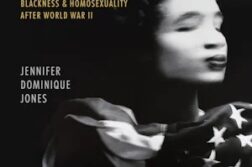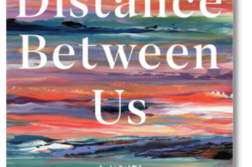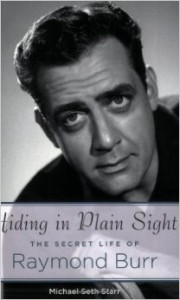 Hiding in Plain Sight: The Secret Life of Raymond Burr
Hiding in Plain Sight: The Secret Life of Raymond Burr
by Michael Seth Starr
Applause Books. 280 pages, $24.95
That Raymond Burr led a closeted dual existence will not be news to most gay pop culture vultures. The week after his death in1993, People magazine printed a cover story pointing out that the wives Burr spoke of in interviews had actually never existed, and that he’d been involved in a long-term relationship with another fella for decades. But in Hiding in Plain Sight, author Michael Seth Starr provides the details of Burr’s intricate web of deceit. Never a romantic lead like Rock Hudson, Montgomery Clift, or Tab Hunter, there was no need for Burr to fabricate a heterosexual private life—that is, until the massive success of the Perry Mason series, in which Burr played the title character. In addition to yarns spun about two wives—both died tragically, according to Burr’s fictions—the actor actually lifted a story from comic actor Red Skelton. Skelton had a son who was dying of leukemia, so he took him on a year-long tour of America as a way of saying goodbye. Burr told the same story to reporters, who repeated it in a media loop so many times that it became a received truth. Starr, a columnist for The New York Post and an experienced biographer, sticks to a just-the-facts-ma’am style, recounting the details without much speculation about Burr’s psyche. Even so, Hiding in Plain Sight approaches the surreal in the ludicrousness of the lies. Burr spoke of military service in World War II, traveling extensively in Asia, speaking several languages fluently, and earning several college degrees—none of which was true. This
biography is yet another sad chapter in the litany of Hollywood’s strange, tortured relationship with homosexuality.
Matthew Hays
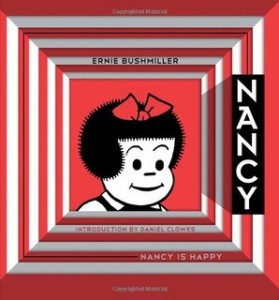 The Nancy Book
The Nancy Book
by Joe Brainard
Siglio Press. 144 pages, $39.50
Always a fan, I have come to appreciate the work of the late Joe Brainard even more over the years. This latest collection of his work is The Nancy Book, a variety of pictorial meditations on the cartoon character Nancy. It’s too bad that Brainard, in the last fifteen years of his life (1942–1994), turned down all invitations to show his work or to publish. Anyway, his riffs on Nancy are whimsical and, most of them, amusing, even the pornographic ones—though the designation “pornographic” may not be appropriate when referring to the depictions of a cartoon character; perhaps instead Nancy is exploring aspects of her sexuality. Brainard’s take on the Nancy brand has the feel of an ironic comment on a national icon, sort of like what Bill Griffith does with his “Zippy” strip—if, in fact, Nancy and Sluggo weren’t already some sort of ironic comment in their original incarnation. These things can be hard to classify. The Nancy Book, which is mostly comprised of Brainard’s illustrations, also includes commentary by Ann Lauterbach and Ron Padgett.
John Mitzel
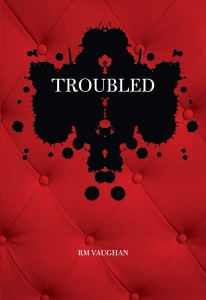 Troubled
Troubled
by RM Vaughan
Coach House Books. 88 pages, $14.95 (paper)
Toronto writer RM Vaughan’s new book is a welcome respite from the recent spate of memoirs that have deluged bookstores. In twisted, arduous detail, Vaughan takes us through his own journey, that of bewildered patient ultimately drawn into a sexual relationship with his therapist. Vaughan’s pain can be felt in almost every line of this beautifully rendered story, all told in the form of a “poetic memoir,” primarily in verse. Vaughan is acutely aware that patients in therapy often have feelings of infatuation for their counselors. He lets us in on the secret, but sentiments shift rapidly from love to lust to hate and back again; at one point Vaughan begrudges the doctor for “his moneyed hands on my ass.” Amid the carefully chronicled pain are welcome injections of humor, including a list of Harlequin Romance titles and porn movie titles that contain the word “doctor.” Included verbatim are the actual letters exchanged between Vaughan and the College of Physicians and Surgeons of Ontario regarding his official complaints about the doctor, reminding us that this is no work of fiction. In the era of Dr. Phil, there’s something richly rewarding about Vaughan’s acid pen getting some kind of revenge on “Dr. M.” Vaughan’s book also reveals that the College reinstated the good doctor several years after suspending his license. “Every system protects its earners,” Vaughan concludes with typical bitterness, “and math is immoral.” It’s a brilliant closing to a devastating book.
Matthew Hays




